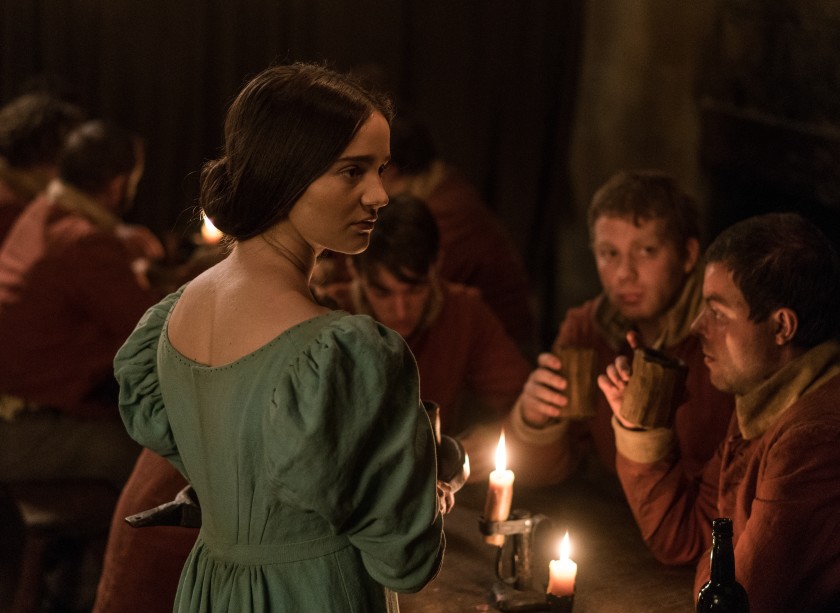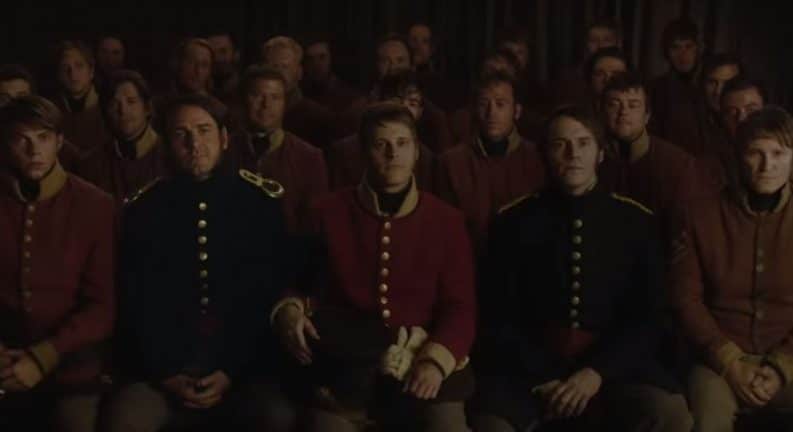
If ever a film spoke to unpalatable truths, then it’s Jennifer Kent’s most recent film, The Nightingale. Where her previous feature The Babadook put a fantastical spin on mental trauma, The Nightingale strips back all varieties of artifice and fantasy, striving to represent a notoriously brutal period in Australia’s colonial past as realistically as possible. In so doing, it thankfully avoids getting mired in modern-day political predilections – there’s not, in my opinion, a clumsy script, nor talking to the audience loudly and slowly to make them get the point. But, by faithfully representing the horrors of history through a plausible, sensitively-acted drama, the history lesson here is doubly effective, because human drama will always appeal to us more than academic treatises. The resulting film is a difficult watch. Certain scenes led to audible gasps from the audience. The Nightingale prevents you, or should prevent you, from looking away.
Set in the early decades of the 19th Century, transportation and the conquest of Australia was in full swing, with Tasmania in particular one of the most brutally-managed and exploited territories in the whole of the country. Were you sent to the penal colonies there, then ostensibly you could eventually earn your freedom but, as both an Irishwoman and a woman, Clare (Aisling Franciosi) has been unable to exercise this right, despite completing her sentence for a petty crime. Hawkins, the commanding officer of the incumbent British militia (Sam Claflin) sees her as barely human, justifying his sexual exploitation of her by reminding her that he’s allowed her to marry – to a fellow Irishman, Aidan (Michael Sheasby). Aidan and Clare are penniless and to a large extent tainted by their pasts as ex-cons, but they have a young baby together, and they seem very happy. Clare keeps hope that she will receive her ticket (her guarantee of freedom) and they will be able to leave for good. Well, that would never do for Hawkins, who has Clare right where he wants her. An altercation follows when Aidan tries to intercede on her behalf, to make Hawkins make good on his promise. The worst happens; in a world where the British military make the rules, and where any semblance of law and order is a long way away, there was never going to be a positive outcome for this powerless, impoverished family, who have no recourse. That said, the brutality of the outcome is truly hideous.

Clare is left a broken woman, with nothing now left to keep her docile. After she tries and fails to get justice via conventional means, she learns that Hawkins and his men have left to go to the nearest town where Hawkins is hopeful of an important promotion. Determined to catch them and avenge herself, she turns to a member of a nearby Aboriginal camp who knows the land. Billy (Baykali Ganambarr) agrees to take her – for a fee – but makes no promises of offering her any help beyond directing her to where she wants to go, making it clear that he doesn’t relish working for white folks. Together, they track Hawkins and his men, working their way through an often hostile, if beautiful landscape.

One of the most interesting dynamics in the film occurs between Billy and Clare; who has the most power here? Is it the disinherited local, who nonetheless has recourse to knowledge and skills? Or is it Clare? Clare is white, and she instantly begins to use language to exercise her authority over Billy (such as by calling him ‘boy’), but then being female carries its own vulnerabilities in this brutal world, and as an Irish woman, she’s a few rungs further down on the ladder the other whites she encounters. It’s a distinction she tries to make clear to Billy, who has little concept of any difference between whites and listens to her with some surprise as she rails against him calling her English. It’s also interesting that Clare uses Irish language, and refreshing to hear it on the big screen – in a similar way to Billy, who uses a moribund Tasmanian language called Palawa Kan, the first time this language has ever appeared in a mainstream film. Language is both power and powerlessness, a marker of culture, but one that is invariably suppressed; Clare and Billy, to a large extent, find that they share some common ground through their use of non-English languages and a friendship begins to grow. It becomes the bedrock of the film, supported by phenomenal acting performances. What isn’t said is as important as what is. Billy infers a great deal about Clare’s plight, and handles it carefully.

Throughout, there is little let-up in the unflinching hardship and cruelty here; thankfully, the British aren’t turned into simplistic villains, and as the narrative follows their own journey we see them as flawed, arrogant, but also frequently scared and isolated from one another, scared boys clinging to the only systems they know. You find yourself hating them, sure, but you see them as weak as much as you see them as bad, particularly in the case of Jago (Harry Greenwood) who is haunted by his role in Clare’s tragedy – a panicked, troubled young man. Eddie (Charlie Shotwell), a child who picks up with the military men and at first gains Hawkins’ favour, is a sad emblem of a broken system, a world where unattached women and children are terrible things to be. But then, almost no one thrives in this environment. Those that had thrived in the environment have been disinherited, transported people are still at the mercies of the system and even the self-assured Hawkins cannot operate without help to do it. The representation of Tasmania at this point in time is of a merciless, indifferent place. Some critics have commented on the detached, under-explored nature of some of the visuals and motifs on screen but for me, it’s exactly as it should be. We glean some sense of other tragic stories unfolding, but then the landscape draws us quickly elsewhere. Likewise, there were several walk-outs during some of the scenes of rape and sexual assault in the film, and it’s absolutely fine for audiences to do that if they feel they simply cannot watch such things any longer, but as I see it, you’re exempting yourself from the nub of the narrative. Perhaps cruel things just are, and desperate people simply try to make sense of this, try to go on.
Admittedly not a film for everyone, then, but an important, ambitious historical drama which clings to you like a fever dream. You do not come out of viewing The Nightingale feeling good about humanity, but you can at least grasp what fragile elements of human goodness there are, and marvel at how this could ever be in such circumstances.
